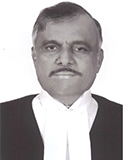
Meet Justice P. Sathasivam and his Notable Judicial decisions
Justice Palanisamy Sathasivam served as the 40th Chief Justice of India from July 19, 2013, to April 26, 2014, and was notable as the first CJI to later be appointed Governor of a state, serving as the 21st Governor of Kerala. Born in Tamil Nadu in 1949, he began his legal career in the Madras High Court, became a permanent judge there in 1996, and was elevated to the Supreme Court in 2007. His Supreme Court tenure was marked by a strong focus on criminal, civil, service, and constitutional matters, authoring 338 judgments.
Judicial Career and Philosophy
Justice Sathasivam was recognized for his clarity, judicial discipline, and advocacy for judicial reforms, including the call for fixed tenures for Chief Justices to ensure continuity and effectiveness in judicial administration. He was known for his work on social justice, human rights, and electoral reforms, often emphasizing the importance of transparency and accountability in public life.
Landmark Judgments
1. Safai Karamchari Andolan v. Union of India (2014)
Justice Sathasivam delivered a landmark verdict recognizing manual scavenging as a practice that perpetuates untouchability and violates fundamental rights. The Court directed the government to implement laws prohibiting manual scavenging, ensure compensation and rehabilitation for affected workers, and eliminate the practice in Indian Railways.
2. Union of India v. National Federation of the Blind (2013)
He mandated a 3% horizontal reservation for persons with disabilities in government employment, clarifying that the 50% reservation ceiling does not apply to disability quotas. This advanced the rights of disabled persons in public employment.
3. People’s Union for Civil Liberties (PUCL) v. Union of India (NOTA Judgment, 2013)
Justice Sathasivam authored the judgment introducing the ‘None of the Above’ (NOTA) option on election ballots, empowering voters to reject all candidates and encouraging political parties to field better nominees.
4. Resurgence India v. Election Commission of India (2013)
He made it mandatory for Lok Sabha nominees to fill all information in nomination papers without leaving blanks, upholding voters’ right to information about their candidates and improving electoral transparency.
5. 1993 Mumbai Blasts Case
Justice Sathasivam presided over the high-profile case, sentencing Bollywood actor Sanjay Dutt to five years’ imprisonment under the Arms Act, and upholding convictions in the Mumbai blasts case, reinforcing the principle of equal justice under law.
Legacy
Justice P. Sathasivam is remembered for his progressive judgments on social justice, electoral reforms, and human rights. His tenure strengthened protections for marginalized groups and advanced the judiciary’s role in safeguarding fundamental rights and democratic processes.












comments